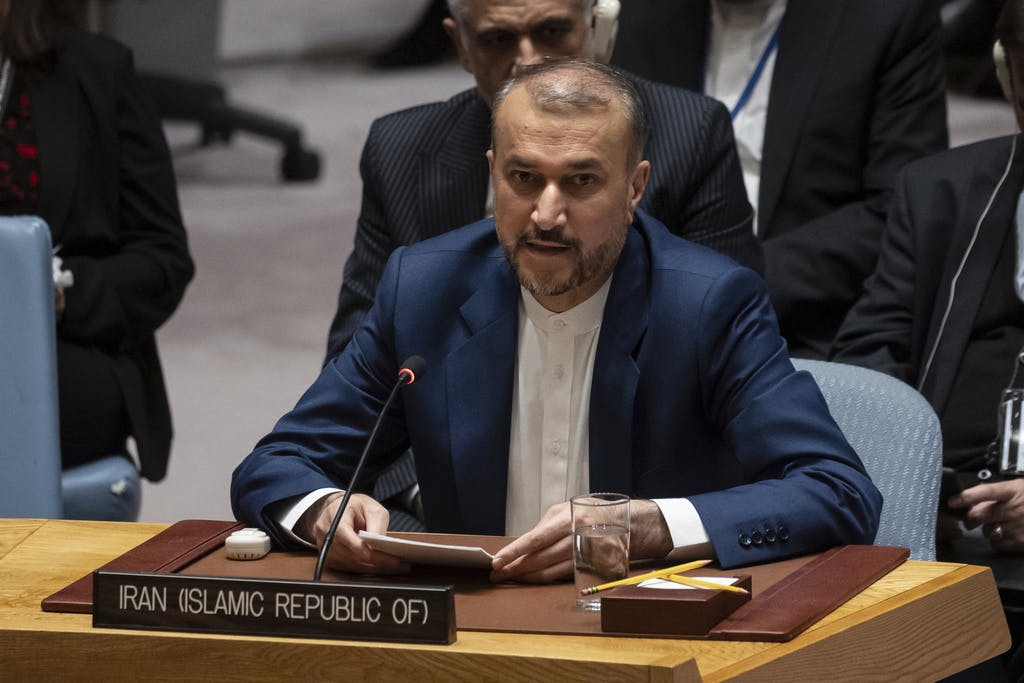‘I Just Heard Enough,’ Yank Envoy Tells the Sun After Walking Out of Iranian Speech at the UN
Biden, meanwhile, emerges as ambiguous on whether he’ll back an Israeli attack on Rafah, Hamas’s last remaining stronghold.

To paraphrase a quote attributed to Winston Churchill, President Biden can always be counted on to do the right thing after trying everything else. Confused signals regarding Israel and Hamas’s last remaining stronghold, Rafah, may show he has been stuck on “trying everything else” but could yet do the right thing.
According to Axios, two unidentified American officials “flatly denied reports that the Biden administration gave a green-light for an operation in Rafah if Israel declines to strike Iran in retaliation for last weekend’s unprecedented attack.” The report followed earlier leaks detailing such a deal.
Yet, perhaps Mr. Biden is finally doing the right thing on Rafah — or Haifa, as he erroneously called it Wednesday in a gaffe. Perhaps he would soon also realize that after trying seemingly everything else with the Islamic Republic, a credible military threat could be the right policy there, too.
On Thursday the Behshad, an Iranian spy ship that has directed the Houthis’ attacks on Red Sea shipping, left the region, reportedly for fear that Israel would strike it. That threat seems more promising for restoring the freedom of navigation on the high seas than a series of ineffective and negligible American strikes on warehouses in Yemen.
Yet, for now the White House message to Israel seems to be emphatic: Stay out of Rafah and ignore Iran, so we can protect you at the United Nations. The American deputy ambassador there, Robert Wood, walked out on the Islamic Republic’s foreign minister, Hossein Amir-Abdollahian, as the Iranian wound down a long diatribe at the Security Council.
“I just heard enough,” Mr. Wood told the Sun. Much of the terrorist-turned-diplomat’s speech was “the usual Iranian nonsense, but the threat to Israel’s existence is serious,” Mr. Wood said.
Mr. Abdollahian attended a day-long Security Council debate on a Palestinian Authority request to approve Palestine as a UN member. As required by American law, Mr. Wood vetoed a Security Council resolution that would in effect create a Palestinian state without Israel’s consent.
Nevertheless, the White House is pressuring Israel to make a “commitment to Palestinian statehood in exchange for diplomatic recognition by Riyadh,” the Wall Street Journal is reporting Thursday.
Meanwhile, Mr. Biden’s oft-repeated “don’t” admonition appears to be intimidating Israel more than its enemies. Beyond diplomatic support at the UN and elsewhere, Israel depends on America for arms — from bullets to high-end fighter jets and anti-missile defense systems — as well as regional coordination and intelligence sharing.
As the Islamic Republic and its proxies endlessly escalate their attacks, therefore, Israel needs to adapt to Mr. Biden’s signature timidity in the face of aggression, a staple of a long career in national security.
As Russia launched the war against Ukraine, the president vowed to stand by an ally. Yet, each time Kyiv asked for certain weapon systems — Abrams tanks, F-15 planes — Washington at first denied the requests before later, often reluctantly, approving them.
Mr. Biden’s guiding principle is fear of escalation if Ukraine attacks Russia on its soil. He is pressuring Kyiv to end its successful campaign of striking Russian oil distilleries. Beyond escalation, the president is eying gasoline prices at home in an election year.
Nevertheless, Mr. Biden is combating Washington isolationists opposing funds for the Ukrainian military. He is hoping that Kyiv can turn the tide of war back in Ukraine’s favor. In his way, the president is now starting to do the right thing after trying everything else.
That is all true in another part of the world as well. Early in Mr. Biden’s presidency, a top goal was to cool off the tight relations his predecessor cultivated with Saudi Arabia. He vowed to make the Kingdom’s de-facto ruler, Crown Prince Mohammed bin-Salman, a global “pariah.”
Oil production cuts on the eve of the midterm election convinced Mr. Biden that perhaps severing relations with one of America’s longest Mideast partners was wrong. A now-famous MbS fist bump followed — and now the White House sees Riyadh as key to the Mideast’s future.
So maybe a mere Israeli “commitment” to a future Palestinian state could give MbS the fig leaf he needs for a signing peace treaty with Israel. Yet, as the weekend Saudis-Israeli cooperation showed, a much bigger incentive is a strong pushback against Tehran and its proxies.
A true reversal of trying everything but the right thing would be one area Mr. Biden’s policy is lacking so far: Credible military action and a threat of American escalation, rather than fear of enemy reprisals, are what’s needed.
The Saudis would sooner sign a treaty with Israel if it successfully clips the Islamic Republic’s wings than if Prime Minister Netnayhu promises to one day recognize a Palestinian state. If Mr. Biden is really torn about whether to help Israel finish off Hamas at Rafah or attack Iran, his bet seems to be simple: both.

